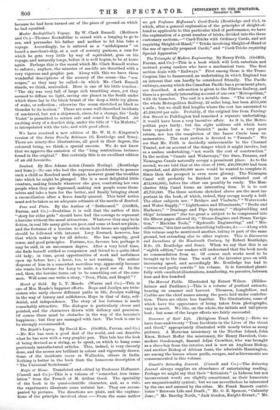The Triumphs of Modern Engineering. By Remy Frith. (Griffith, Farran,
and Co.)—This is a book which will both entertain and instruct young readers who have a mechanical turn. The first section deals with "Railways." First among these is the Trans- Caspian line to Samarcand, an undertaking in which England has an interest that can hardly be considered friendly. The Pacific railways, among which the Canadian Pacific has a prominent place, are described. A sub-section is given to the Pilatus Railway, and there is a peculiarly interesting account of our own "Metropolitan," with its branches. The cost is a notable item. " The average of the whole Metropolitan Railway, 22 miles long, has been £515,000 a mile ; but we shall find lengths where the cost has amounted to £1,200,000 per mile. Probably, if the original line from Farring- don Street to Paddington had remained a separate undertaking, it would have been a very lucrative affair. As it is, the Metro- politan pays fairly; but the eight millions odd which have been expended on the " District " make but a very poor return, nor has the completion of the Inner Circle been re- munerative. The next section is devoted to " Tunnels." We see that Mr. Frith is decidedly unfavourable to the Channel Tunnel, not on account of the danger which it might involve, but as a useless undertaking, "not worth the cost of construction." In the section " Canals and Waterways," the Suez, Panama, and Nicaragua Canals naturally occupy a prominent place. As to the second, we are told that at the close of 1888, £46,000,000 had been expended, and £20,000,000 more would be wanted to complete it. Since then the prospect is even more gloomy. The Nicaragua Canal will probably be finished (at an estimated cost of £12,000,000), before the other can possibly be ready. The Man- chester Ship Canal forms an interesting item. It is to cost £5,750,000. The three sections sketched above are the most im- portant in the book, of which, indeed, they occupy nearly a half. The other subjects are : " Bridges and Viaducts," " Waterworks and Water Supply," "Lighthouses and Illuminants," "Docks and Harbours," " Drainage and Pipe Systems," " Shipbuilding and Ships' Armament" (far too great a subject to be compressed into the fifteen pages allowed it), " Steam-Engines and Steam Naviga- tion," " Machine Tools," " Hydraulic Engineering," and " Mis- cellaneous," this last section describing balloons, &c.—Along with this volume may be mentioned another, taking in part of the same ground, but extending also to other regions. This is Discoveries and Inventions of the Nineteenth Century, by Robert Routledge, B.Sc. (G. Routledge and Sons). When we say that this is an " eighth edition," our readers will understand that the book needs no commendation from us. Of course such works need to be brought up to the time. The work of the inventor goes on with increasing speed, and accordingly Mr. Routledge has had to " revise and partly rewrite " his volume. It is furnished plenti- fully with excellent illustrations, numbering, we perceive, between four and five hundred.






















































 Previous page
Previous page